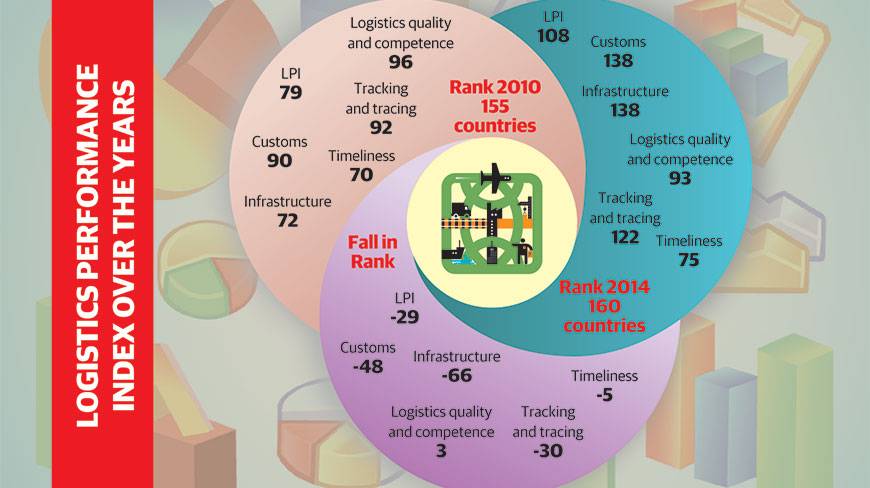Bangladesh has been ranked 108th out of 160 countries in logistics performance index (LPI), according to a new World Bank report released yesterday.
Out of top 10 low-income countries, Bangladesh emerged as a worst performer in providing efficiency in trading goods, according to the report titled “Connecting to Compete 2014: Trade Logistics in the Global Economy.”
Among South Asian nations, Bangladesh is above Bhutan that was placed in 143, but below India that was ranked 54th, followed by Pakistan 72nd, the Maldives 82nd, Sri Lanka 89th and Nepal 105th.
Bangladesh was not included in the 2012 LPI, but stood at 79 in 2010, much above South Asian countries. The WB Group’s International Trade Unit has prepared the LPI about every two years since 2007.
Policy Research Institute executive director Ahsan H Mansur said Bangladesh is improving in some areas of trade facilitation but not enough commensurate with the volume of growth in trade. “That’s why we are falling behind other countries.”
Bangladesh scored low on a number of dimensions in trade – including customs performance, infrastructure quality and timeliness of shipments – that have been recognised as important to development.
It was now placed in 138th in customs performance against 90 in 2010, 138th in infrastructure against 72nd, 80th in international shipments against 61st, 122nd in tracking and tracing against 92nd and 75th in timeliness against 70th.
However, it has made insignificant improvement in logistics quality and competence to 93rd from 96th during the time.
In the 2014 LPI report, Germany showed the world’s best overall logistics performance. Somalia had the lowest score.
“The gap between the countries that perform best and worst in trade logistics is still quite large, despite a slow convergence since 2007,” said the report.
This gap persists because of the complexity of logistics-related reforms and investment in developing countries, and despite the almost universal recognition that poor supply-chain efficiency is the main barrier to trade integration in the modern world, it said.
“The LPI is trying to capture a rather complex reality: attributes of the supply chain,” said Jean-François Arvis, Senior Transport Economist and the founder of the LPI project.
“In countries with high logistics costs, it is often not the distance between trading partners, but reliability of the supply chain that is the most important contributor to those costs.”
As with previous editions, the 2014 report finds that high-income countries dominate the world’s top-ten performers.
Among low-income countries, Malawi, Kenya, and Rwanda showed the highest performance. In general, the trend across past reports has been that countries are improving and low-performing countries are improving their overall scores faster than high-performing countries.
The 2014 report finds that low-income, middle-income, and high-income countries will need to take different strategies to improve their standings in logistics performance.
In low-income countries, the biggest gains typically come from improvements to infrastructure and basic border management.
This might mean reforming a customs agency, but, increasingly, it means improving efficiency in other agencies present at the border, including those responsible for sanitary and phyto-sanitary controls. Often, multiple approaches are required.
“You can’t just do infrastructure without addressing border management issues,” Arvis said. “It’s difficult to get everything right. The projects are more complicated, with many stakeholders, and there is no more low-hanging fruit.”
Middle-income countries, by contrast, usually have fairly well-functioning infrastructure and border control. They generally see the biggest gains from improving logistics services, and particularly outsourcing specialized functions, such as transportation, freight-forwarding, and warehousing.
In high-income countries, there is a growing awareness of – and a demand for – “green logistics,” or logistics services that are environmentally friendly.
In recent years, as tariffs have dropped globally, logistics and other aspects of trade facilitation have gained profile as an arena for reducing trade costs.
“The LPI is a concrete tool for raising awareness and spurring improvements,” said Jeffrey Lewis, Director of the Economic Policy, Debt and
Trade Department. “It allows us to evaluate constraints across a broad set of countries.”
Source: DHaka Tribune

